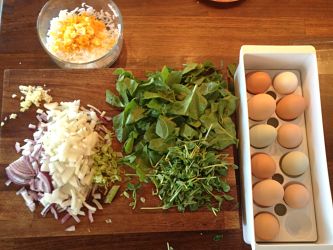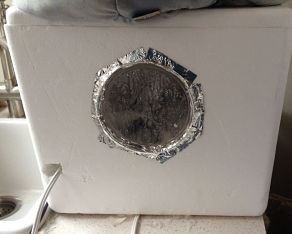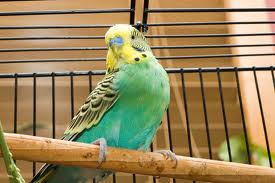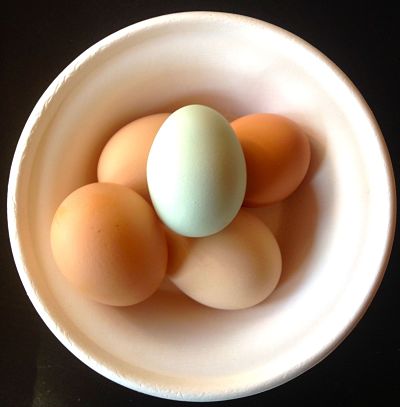Here in rainless Northern California, I woke gratefully to the sound of rain. The chickens may not be happy about it, but it is such a relief to be having a normal winter day. Luckily, in yesterday’s brilliant sun I did a bunch of yard work including cleaning the chicken coop, so at least they are cozy.
 And they are laying. Here were the ingredients for yesterday’s breakfast, although I only used two of the eggs. It made for a delicious start to the day.
And they are laying. Here were the ingredients for yesterday’s breakfast, although I only used two of the eggs. It made for a delicious start to the day.
The wonderful, golden Cocktail Grapefruit are in season now, a very sweet grapefruit with a zillion seeds, but worth it. Add grapefruit, and breakfast looked like this.

Then I decided to try the hot and sour soup recipe from Serious Eats, by J. Kenji López. I was interested to try his technique for rapid chicken broth, which involves hacking chicken parts into bits, blanching them first, and then cooking with a hambone and “aromatics” (onion, garlic, scallions, ginger).
It worked–excellent broth in a little over an hour, but it involves turning your kitchen into an abattoir, little bits of chicken parts flying everywhere. There’s a reason butchers are always pictured in those blood-smeared white smocks. Definitely not for the faint of heart. Maybe Kenji knows a way to do this without the grisly bit dispersion, but if so, he doesn’t mention it. nInstead he says “Hack your chicken carcasses to bits before making stock. Not only will it make you feel like a medieval viking-style badass, but it’ll also make your broth come together much faster. The more finely you chop the bones, the more surface area they have, and the more channels for proteins, minerals, and other goodies to get extracted into the broth.” So caveat cook.
Because this recipe required a specific Chinese fermented rice vinegar (“essential to the flavor”), I had to head down to the Asian mall, and as it was Saturday and just after Chinese New Year, I encountered a drumming, whistling band and leaping tigers:



Very loud, cheerful and colorful, which made up for the crowds and the ordeal involved in buying my slim bottle of vinegar.
The soup is really delicious, if anyone wants a lovely rainy day project.
 Actually, I had put a few of my hens’ eggs under her for the first ten days, until the new eggs arrived. She had to start over with the new batch. Continue reading “Broody”
Actually, I had put a few of my hens’ eggs under her for the first ten days, until the new eggs arrived. She had to start over with the new batch. Continue reading “Broody” 










